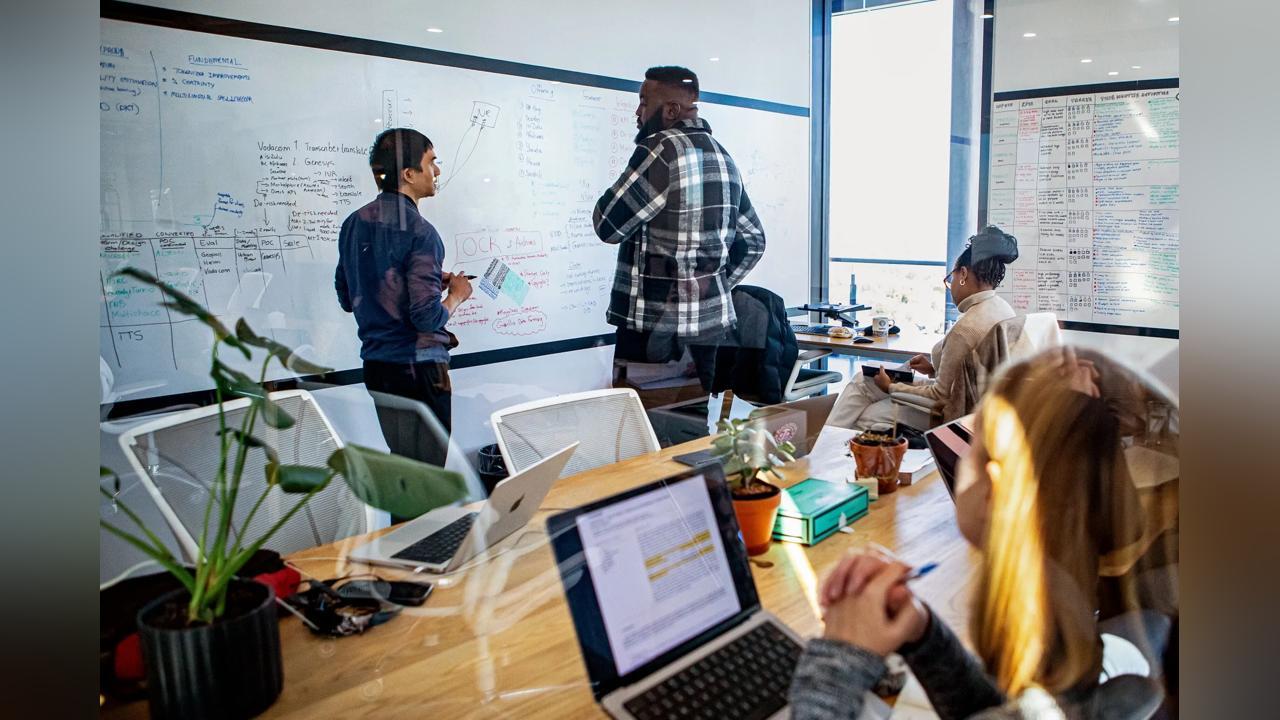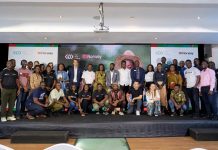Africa-Press – Botswana. Earlier this year, in a conference room at the Nairobi headquarters of a social impact startup named Qhala, a group of executives from tech firms across the continent gathered to hear a presentation about the promise of AI. The speaker was Harrison Li, chief solutions architect for Huawei Cloud in sub-Saharan Africa, and the subject was DeepSeek, a buzzy new entrant in the global artificial-intelligence race.
Huawei Technologies Co. and DeepSeek’s parent, High-Flyer, started collaborating a couple years ago, and now, Huawei is bundling access to the large language model with its own storage and cloud computing services. Li’s pitch is that China’s DeepSeek is capable of matching Silicon Valley’s OpenAI for a fraction of the cost and it can run on less-expensive hardware.
“DeepSeek is so hot,” Li said during the gathering, overlooking the city’s business district. “No one wants to talk about anything else.”
He couldn’t have devised a better pitch for his audience. Outside of South Africa, computing resources on the continent are often expensive and scarce. Making AI cheaper and less power hungry stands to put the world’s most in-demand technology within reach of millions more people — and to empower African startups to design products for African users.Li clicked through a slide deck, presenting packages tailored to all levels of users and businesses: a free tier, pay-as-you-go hourly rates for DeepSeek models hosted on Huawei Cloud and more compute-intensive options for developers building chatbots and apps. For governments, he explained how private cloud systems could be physically installed in offices and ministries.
The breakfast event was organized by Shikoh Gitau, Qhala’s chief executive, who is overseeing the development of her company’s own AI-powered chatbot. Over the previous year, the Kenyan computer scientist experimented with a roster of Western models — Anthropic’s Claude, Google’s Gemini, Meta’s Llama. Each impressed her, but none made financial sense for a cost-conscious young business that was building large-scale applications. Then, in January, DeepSeek entered the market.
“I celebrated when I first heard about DeepSeek,” Gitau said, citing its “really, really low” price points. She soon migrated Qhala’s chatbot to the Chinese-made system. Now, Li is hoping her decision will inspire other African entrepreneurs and enterprises to follow suit.
Although much of the world’s attention has been focused on Western tech companies vying for lucrative corporate contracts in the US and Middle East, the meeting in Nairobi illustrates how their Chinese rivals are taking a different approach. OpenAI and its American competitors have focused almost exclusively on proprietary AI — models whose software, training data and algorithms are entirely controlled by their parent companies, with customers paying for access. Chinese firms like Huawei and Alibaba Group Holding Ltd., by contrast, are courting Africa’s startups and innovation hubs with open-source AI models — ones that can be accessed and modified for free, letting companies build products without expensive licenses.
This strategy, with parallels to China’s Belt and Road Initiative for physical infrastructure, is not designed for immediate profit. Africa’s entire digital economy, valued at roughly $180 billion, pales in comparison to OpenAI’s $500 billion valuation in recent share sales. Instead, it’s a long-term bid for customers, soft power and the vast troves of data that will shape the future of artificial intelligence.
When it comes to AI, it’s “all about spheres of influence,” said Akhil Bhardwaj, an associate professor at the University of Bath who studies the implications of the technology’s adoption. Publicly, Chinese officials have touted the benefits of democratizing AI and expressed concern about poorer countries falling behind. At the World AI Conference in Shanghai in July, Premier Li Qiang declared that “every country, enterprise, and group should have equal rights to develop and utilize AI.” To achieve this, he offered China’s technical skills to “help countries around the world, especially those in the global south.”
To some critics, this carries ominous echoes of Belt and Road programs that helped some poor countries build critical infrastructure like ports, highways and airports, but left them heavily indebted and financially dependent on Chinese suppliers.
In Africa, as in Latin America and Southeast Asia, China has a backend advantage. Its AI products flow into a multi-tiered tech infrastructure that, with the help of generous state subsidies, Chinese companies have spent years building. As American tech firms targeted wealthy regions, Huawei courted emerging market consumers with low costs and aggressive marketing. Huawei, now the world’s top telecom equipment provider, and ZTE Corp. have supplied much of Africa’s equipment for data centers, 5G wireless systems and fiber-optic networks. Chinese companies also dominate further down the tech stack: Transsion controls much of Africa’s smartphone market, with Xiaomi Corp. and Honor gaining ground, and ByteDance Co.’s TikTok is one of the most downloaded apps.
The outsized role that Chinese companies play in overseeing Africa’s tech infrastructure has alarmed some privacy experts, who worry that there are no safeguards in place to keep sensitive data from ending up in Beijing. That’s drawn attention from a US government keen to constrain China’s AI expansion, which Huawei’s Li alluded to during his presentation — “some other countries don’t like us to grow up.”
Yet to many tech entrepreneurs in Africa, China’s lightweight, low-cost AI models are the best option for building. “All over Africa, small teams are working to fine-tune DeepSeek for local applications,” said Vukosi Marivate, a professor of computer science at the University of Pretoria and a co-founder of the research lab Lelapa AI.
“We’ll start seeing results later this year.”
Olubayo Adekanmbi, the co-founder and chief executive officer of EqualyzAI, a Lagos-based startup that tailors small-scale AI models for African companies, never wanted to work with large-language models. As he saw it, they were too expensive, demanded too much computing power, and Nigeria simply didn’t have the infrastructure to ensure they could run properly. Instead, he wanted to build lightweight, purpose-built models trained on African data. Then Chinese founders began open sourcing their models. “Chinese models offer flexibility, lower cost, and the potential for local data sovereignty,” said Adekanmbi.
In Nigeria, OpenAI’s GPT and Google’s Gemini models are struggling for adoption because of high costs, licensing restrictions and lack of customization to local languages for its population of nearly 240 million people. “Issues such as data privacy concerns, regulatory uncertainty and the risk of vendor lock-in deter many Nigerian organizations from relying on proprietary Western AI platforms,” said Adekanmbi.
To do this, EqualyzAI’s engineers used DeepSeek’s open-source architecture as scaffolding to start creating specialized small models as well as automated smart assistants. The vast majority of data in Africa hasn’t been digitized, so contractors across the continent are paid to gather agricultural, medical and financial records, as well as audio in Yoruba, Hausa and Nigerian-accented English. EqualyzAI then trained individual models on the relevant datasets, and tweaked the open weights — the code that instructs an AI model to emphasize or ignore certain information — for each customer. The resulting chatbots and apps are now being used by fintech companies, e-learning platforms and health-care startups. Like all companies that build on DeepSeek, they can choose to either host their products locally and pay for computing and storage infrastructure, or go through providers like Huawei. EqualyzAI does the former.
Unlike proprietary models, which charge for licensing and infrastructure use, DeepSeek customers are charged for the computations the model performs. Pricing is based on the use of tokens, words or small chunks of text that the model processes to generate new content. Huawei offers DeepSeek users two million free tokens a day.
For African startups like EqualyzAI, DeepSeek is “orders of magnitude” cheaper than competitors, Adekanmbi said. DeepSeek Chat, for instance, charges 27 cents to process one million tokens of query sent and $1.10 for every million tokens it generates in response. OpenAI’s GPT-4o charges $5 to process the same amount of tokens of query sent and $15 to produce the same amount of tokens in response. If EqualyzAI used GPT-4o, the startup would pay about $12,500 a month to train a small-language model for an e-learning platform, as opposed to the roughly $2,700 per month it now pays DeepSeek for the same task.
Gitau, who worked with Google and Microsoft Research before setting up Qhala five years ago, explained that there are many reasons why Silicon Valley models aren’t well suited for users in Africa. As US-made models require more tokens to process foreign and unfamiliar words, computing costs often end up being higher for users not working in English. And because the training data is largely Western, the models also miss cultural nuance, and will sometimes wrongly assume a person’s gender based on their name or generate imagery that reflects racial stereotypes. “In the world according to San Francisco,” she said, “Africa’s context is erased.”
Silicon Valley companies have made efforts to integrate some of the more than 2,000 languages and dialects spoken across Africa into certain of their models. This month, OpenAI collaborated with the University of Lagos to host a two-day OpenAI Academy event in an attempt to reach more builders and users. Earlier, OpenAI and Meta partnered with French telecom Orange to train bespoke open-source models on Wolof and Pulaar. Yet US-made open-source models are still in the very early stages of development.
Meanwhile, Cereloop, a Nigerian education startup, has been fine-tuning Alibaba’s Qwen model to build AI products that students can use offline to study science and math. (Qwen is also built into Transsion’s popular Tecno brand smartphones.) The Nairobi-based cloud infrastructure provider Pure Infrastructure Ltd. is using DeepSeek-based models to explore security applications for Telum Technologies, a digital infrastructure provider, and to analyze economic data for a large Kenyan enterprise. Innova, a fintech startup in Kenya, uses DeepSeek to analyze business data and evaluate investment risks, while Angani, the biggest cloud provider in East Africa, deploys DeepSeek alongside Llama and other open-source models.
“Many technology companies use Chinese models like DeepSeek and Qwen,” said Phares Kariuki, the chief executive officer of Pure Infrastructure. “Larger companies in Africa, too, have started adopting them, but not at scale.”
Hanging over any conversation about AI in Africa is the fear that the continent’s startups might end up caught in the middle of a US-China trade war. In May, the US Department of Commerce tightened restrictions on Chinese AI hardware, warning that the use of Huawei’s Ascend AI chips anywhere in the world violates US export controls. Should the Trump administration take further measures, there is fear that “Africa could be shut out,” said Terrence Okeke Taylor, executive chairman of the African Academy of Artificial Intelligence, which advises banks, businesses and governments on AI use.
The stakes of relying too heavily on any single country’s tech were vividly illustrated for three days in mid-June, when AI giants Alibaba, ByteDance, Tencent Holdings Ltd. and DeepSeek — whose servers are located in China — disabled their image-recognition and instant Q&A features on consumer-facing products to prevent cheating during China’s intensely competitive Gaokao, or university entrance exams. Suddenly, chatbots, image recognition tools, and AI analytics apps in Accra, Lagos and Nairobi experienced slowdowns and service interruptions that their creators were powerless to fix.
It was “a perfect illustration of the continent’s growing digital dependency on foreign AI infrastructure,” Nairobi-based AI strategist Sidney Essendi wrote on LinkedIn.
Such incidents have generated concern around another sensitive issue — who can access the data that big tech companies host on their servers. Huawei technicians have been accused of helping African governments, including authoritarian ones, spy on political opponents. Huawei and the governments deny the claims, but questions remain about the risk of bringing in Chinese companies to oversee surveillance technologies and smart city programs in Africa.
While most big Western models typically comply with European laws governing transparency around data collection and processing, which strictly control how they interact with customers’ data, DeepSeek’s chatbot does not. Instead, it often stores user data — including chat histories, prompts and location data — on servers in China, which can be accessed by the government. DeepSeek’s privacy policy now allows users to request or appeal by email to address their privacy concerns.
Yet, due to data security concerns, DeepSeek’s chatbot isn’t available in Italy, and Germany has asked Apple and Google to remove the app from their stores. In South Korea, it was briefly pulled from app stores for transferring sensitive personal data to overseas entities, including a ByteDance affiliate, without user consent.
DeepSeek and Huawei did not respond to emailed requests for comment on privacy issues.
For some entrepreneurs, data privacy is a concern. James Ong’ang’a, CEO and founder of the Nairobi-based education tech company LoHo Learning, said that it was a factor for him when choosing an AI model. “For child-centered learning,” Ong’ang’a said, “Western open-source models deployed on edge devices offer a more responsible, secure, and future-proof approach for Africa, at least at this moment.”
Still, some African tech leaders view the controversy as overblown. “Western model makers can’t convince us that China AI models are spying on us,” said Lacina Kone, the director general and CEO of Smart Africa, an organization tasked with defining the continent’s digital agenda. Others acknowledge the risk, but dismiss the notion that there are better alternatives. “There’s also a debate in Africa whether Western or Chinese AI models are colonizing Africa through data,” said Taylor of the African Academy of Artificial Intelligence. “It’s an ongoing thing.”
With the world’s fastest-growing population and a digital economy that’s expected to swell to $712 billion by 2050, governments and startups across Africa are starting to ask whether the continent’s tech future could be more independent. In the best-case scenario, that would mean building AI infrastructure and ecosystems, training AI models and apps on African languages and data, and housing and running everything locally.
At the moment, that’s a long way off. The vast majority of Africa lacks the investment, energy infrastructure, engineering talent and ability to efficiently digitize vast amounts of data, and none of this is likely to be within reach anytime soon. So for now, companies that can afford to are hedging their bets. Some are already blending Chinese-backed cloud services and AI models with American-made AI products. Africa’s biggest telecommunications company, MTN Group Ltd., has started building out its own AI data centers, and said it develops applications on its existing platforms or in-house where possible, or partners mostly with Western AI firms that can offer scalable technologies.
The NCBA Group, a financial services conglomerate with more than 60 million customers across East and West Africa, said it’s considering adding DeepSeek to the suite of Western AI products it currently uses.
“While we expect Chinese models to play a role, especially in the short term,” said Patrick Kariuki, chief data officer at NCBA Group, “the path forward will require a more balanced, multi-model approach.”
bloomberg
For More News And Analysis About Botswana Follow Africa-Press






